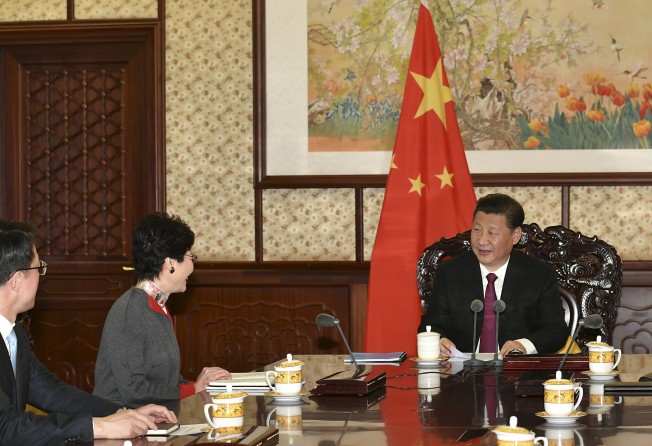Carrie Lam faces test after glowing duty visit
Despite the praise of state leaders, it is important for her to get on with economic and social development after years of bitter political confrontation

There was a time when the chief executive’s duty visit to the capital was nothing more than a courtesy call on state leaders to assure them that everything was going smoothly in the city. Increasingly, the format of the visit has become more formalised and work-oriented, as shown in the one concluded by Carrie Lam Cheng Yuet-ngor yesterday.
After just five-and-a-half months in office, Lam has gained more than just a glowing report card from the central government. She was showered with praise by state leaders, although not as much as in the case of her predecessors in the early years after the handover. But the purpose of the visit has long become more than a boost to the chief executive’s authority and, in line with her proactive style of governance, Lam returned home with substantive achievements in some areas, including some new measures to benefit Hongkongers working and studying on the mainland. But there is also pressure for her to deliver even more.
In her three-day maiden visit, Lam sealed a deal with the National Development and Reform Commission to advance the city’s participation in the “Belt and Road Initiative”, China’s trade strategy, followed by another pact to enhance a cross-border notification system on the arrest of criminal suspects by either side.
Premier Li Keqiang was particularly impressed by her efforts in driving the “Greater Bay Area” framework, which links Hong Kong with Macau and nine other cities in Guangdong province into an integrated economic and business hub. He hoped the city’s economic development could integrate its own strengths with national needs. As we explore new areas of growth, we should also guard against different risks, he said.
In a separate meeting yesterday, President Xi Jinping said the new leader had made a good start to her term. He was pleased to see that efforts were being made in developing the economy, improving livelihoods and promoting social stability. He also commended her on arrangements made for officials to familiarise themselves with directions set out at the recent Communist Party congress. But he also seized the opportunity to reiterate the need to integrate the comprehensive jurisdiction of Beijing with the city’s high degree of autonomy under one “country, two systems”, which he stressed was an important part of national development.
If the political rhetoric no longer sends shock waves as it used to, it is because the public realises that the years when the Special Administrative Region was largely left on its own have long gone. Beijing has legitimate rights and interests to make sure that the city is developing in a way not just for its own good, but also in the national interest. The remarks by state leaders underline Beijing’s expectations in the coming years. Now that the political atmosphere is no longer as tense as it was a few years ago, it is important to leave behind bitter confrontation and get on with economic and social development. This will put Lam further to the test.